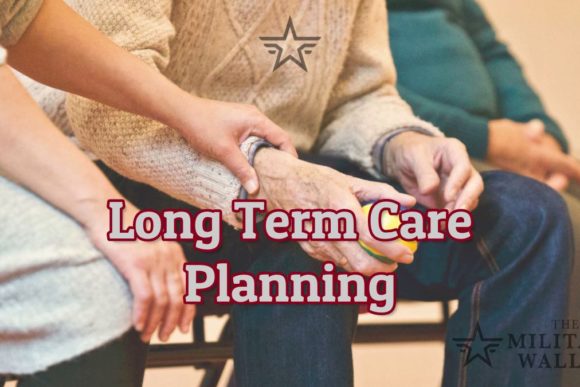Disclosure: This article is sponsored by Navy Mutual.
Have you ever considered long term care coverage? If not, you should. An overwhelmingly large percentage of the population will need some form of long term care as they age.
As many as 69% of the people turning 65 this year will need some level of long term care. 15% of those people will spend $250,000 or more on those care costs.
Let that sink in for a moment. Without proper planning, long term care expenses have the potential to significantly impact your life savings or create an excessive financial burden for family members.
Proper planning can help you avoid this financial burden. Let’s look at how you can establish a long term care plan today and enjoy the peace of mind that comes with knowing your financial future is secure.
What is Long Term Care?
Long term care is provided by skilled nursing services either at home or in a facility devoted to assisting people complete Activities of Daily Living (ADLs). There are six generally acknowledged ADLs; eating, bathing, dressing, toileting, transferring, and continence.
While health insurance covers immediate medical conditions and ongoing maintenance treatment, very few policies cover prolonged care required for some medical conditions at a residence or nursing home. This care is most often required as a result of a chronic physical condition, illness, disability, or cognitive impairment. As opposed to most medical care, long term care is not designed to cure a medical condition.
How Much Does Long Term Care Cost?
The cost of long term care depends on various factors including your age, gender, health status, and living arrangements. The costs generally increase based on age, the level of medical care required, the duration of care, and the location where care is provided.
For rough planning purposes, the national median is currently $90,000 a year for a semi-private room and $48,000 a year for assisted living or trained home services. These costs are expected to increase in the future with inflation by about 2.5% per year.
Know the numbers:
- Roughly 70% of people will have to cover long term care expenses in their lifetime.
- Approximately 25% of people will incur at least $50,000 in out-of-pocket long term care expenses.
- The next 25% will average $100,000 in expenses.
- The remaining 20% will exceed $100,000 in long term care expenses.
Which Costs Are Covered by Health Insurance or the VA?
It’s important to note that the majority of these costs will not be covered by health insurance, Medicare, or the VA. Typically, only limited and specific types of long term care costs are covered. Medicare and health insurance generally cover long term care costs that are rehabilitative, short-term, and medically necessary. Medicare, VA, and health insurance plans are not designed to cover the custodial or personal care services provided by long term care.
Medicaid is a backstop and will pay for a large share of long term care services, but to qualify, your income must be below a certain level and you must meet minimum state eligibility requirements. The requirements are based on the amount of assistance you need with ADL.
VA long term care services are available only to veterans enrolled in the VA health system, for service-related disabilities, and to certain veterans based on income eligibility. Veterans may be required to meet a minimum disability level to be eligible for some services. The VA does not pay for room and board in live-in facilities but does have programs to help veterans stay in their homes using The Housebound Aid and Attendance Allowance Program, and via the Veteran Directed Home and Community Based Services program (VD-HCBS). Both programs are supplemental, have eligibility requirements, and co-pays that vary with the veteran’s income. Visit the VA website for more information.
How Do You Plan for Long Term Care?
There are a few different strategies to prepare for long term care costs, so it is important to consider which would be best for your family and financial situation.
Strategy #1: Plan to Self-fund the Costs
Pay for the cost yourself or ask family members to pay for it. This plan is only recommended for those who already have substantial savings in place.
Strategy #2: Purchase a Traditional Long Term Care Insurance Policy
Most long term care insurance policies cover care expenses in the event you are unable to perform two ADLs, or in the event of cognitive impairment. Many of these policies require a premium payment until death or qualified long term care claim. The premium cost is usually not fixed and can increase. In addition, if the insured died prior to reaching the 90-120 day exclusion period, no benefits would be paid to anyone in exchange for that lifetime of premium payments. The number of insurers offering traditional long-term care policies has also fallen from 125 in the early 1990s to approximately 15 today.
Federal Long Term Care insurance plans are available to active duty military and their spouses. Note that with Federal Long Term Care and most other long term care insurance options, there is medical underwriting, and not everyone who applies is approved. Once you leave the military, you can keep your Federal Long Term Care insurance as long as you continue to pay the premiums. It is important to keep in mind that long term care insurance only covers long term care costs, so there is a chance you will never see a benefit from premium payments.
Strategy #3: Purchase a Life Insurance Policy with Long Term Care Features
Some life insurance policies, like our Flagship Whole Life, have settlement options allowing access to your death benefit in the event you that are unable to perform two ADLs; much like a traditional long term care insurance policy.
The main advantage of this long term care strategy is that the premium payments result in a guaranteed benefit even if long term care is not required. Fixed-rate premiums are also possible with this strategy as opposed to most traditional long term care insurance policies.
Who Should Plan for Long Term Care?
While not everyone may need or be able to purchase coverage, everyone should plan for the possibility of needing long term care. More specifically, people with moderate income and assets are most likely to benefit from strategies #2 and #3, since they have assets to protect but could end up depleting all of their savings if prolonged care is needed.
Planning for long term care scenarios in advance will allow you to select a policy type or combination of strategies that meets your specific needs and gives you more control over the type and quality of care. It will also allow you to have less dependence on others and can protect your assets and financial legacy.
You can learn more by contacting Navy Mutual.





Comments:
About the comments on this site:
These responses are not provided or commissioned by the bank advertiser. Responses have not been reviewed, approved or otherwise endorsed by the bank advertiser. It is not the bank advertiser’s responsibility to ensure all posts and/or questions are answered.
Henry Kilpatrick says
Please send me more information about long term care to include rates per month for spouse and myself.. thankyou.